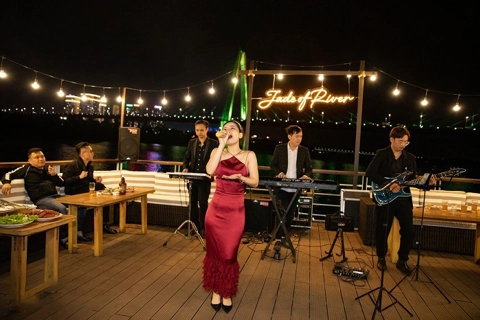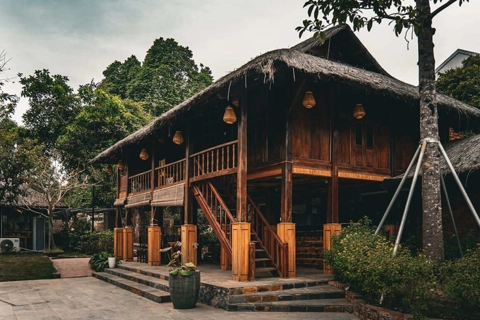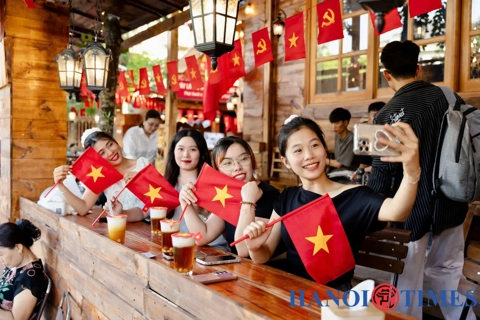Travel
European Capitals of Culture introduced to Vietnamese
Mar 29, 2019 / 05:59 PM
The European capitals of culture program was first suggested by former Greek Minister for Culture in 1983, and the program was set up in 1985.
A press conference was held in Hanoi on March 29 to introduce European Capitals of Culture program, bringing European cultures closer to travel lovers in Vietnam.
The event was part of the 2019 Vietnam International Travel Mart, which takes place in Hanoi from March 27 to 30.
Tourism can help build communities, and contribute to the socio-economic development of countries around the world, including those in Europe and Vietnam, said Deputy Head of Cooperation at the European Union Delegation to Vietnam Tom Corrie at
According to Tom Corrie, there are several reasons to introduce the European Capitals of Culture program to Vietnamese tourists.
“Firstly, we think it’s an excellent program for promoting and developing cultural tourism, which might give inspiration to Vietnam or even the wider ASEAN region. Secondly, we want to give the opportunity for you to learn more about this year’s capitals of Matera and Plovdiv,” said Tom Corrie.
The European Capitals of Culture Program was first suggested by former Greek Minister for Culture in 1983, and the program was set up in 1985. Since those early beginnings, the idea was to promote different European cultures and to have a series of annual events where the best events in terms of performances, concerts, and exhibitions could be organized.
In recent years, over 60 cities have been European cultural capitals. Cities are chosen five years in advance, so they have a sufficient time to prepare a program and invest in infrastructure if needed.
Deputy Head of Cooperation at the European Union Delegation to Vietnam Tom Corrie commented that culture is another way in which people are brought together.
“I hope that by combining both tourism and culture, the EU’s aim to foster mutual understanding and a shared heritage both now and in the future,” Tom Corrie said.
On her side, Bulgarian Ambassador to Vietnam Marinela Petkova said that Plovdiv, Bulgaria’s city, has been selected to represent the diversity of the European heritage and history. It is one of the world’s oldest living cities, continuously inhabited, where human activity never stopped since about 8,000 years ago. Plovdiv lived through various chapters of the Bulgarian history, and nowadays many of its historical sites and monuments date back from the Roman, Byzantine and Ottoman empires.
The event was part of the 2019 Vietnam International Travel Mart, which takes place in Hanoi from March 27 to 30.
Tourism can help build communities, and contribute to the socio-economic development of countries around the world, including those in Europe and Vietnam, said Deputy Head of Cooperation at the European Union Delegation to Vietnam Tom Corrie at

A press conference to introduce European Capitals of Culture program on March 29. Photo: Ha Phuong
|
“Firstly, we think it’s an excellent program for promoting and developing cultural tourism, which might give inspiration to Vietnam or even the wider ASEAN region. Secondly, we want to give the opportunity for you to learn more about this year’s capitals of Matera and Plovdiv,” said Tom Corrie.
The European Capitals of Culture Program was first suggested by former Greek Minister for Culture in 1983, and the program was set up in 1985. Since those early beginnings, the idea was to promote different European cultures and to have a series of annual events where the best events in terms of performances, concerts, and exhibitions could be organized.
In recent years, over 60 cities have been European cultural capitals. Cities are chosen five years in advance, so they have a sufficient time to prepare a program and invest in infrastructure if needed.
Deputy Head of Cooperation at the European Union Delegation to Vietnam Tom Corrie commented that culture is another way in which people are brought together.
“I hope that by combining both tourism and culture, the EU’s aim to foster mutual understanding and a shared heritage both now and in the future,” Tom Corrie said.
On her side, Bulgarian Ambassador to Vietnam Marinela Petkova said that Plovdiv, Bulgaria’s city, has been selected to represent the diversity of the European heritage and history. It is one of the world’s oldest living cities, continuously inhabited, where human activity never stopped since about 8,000 years ago. Plovdiv lived through various chapters of the Bulgarian history, and nowadays many of its historical sites and monuments date back from the Roman, Byzantine and Ottoman empires.








